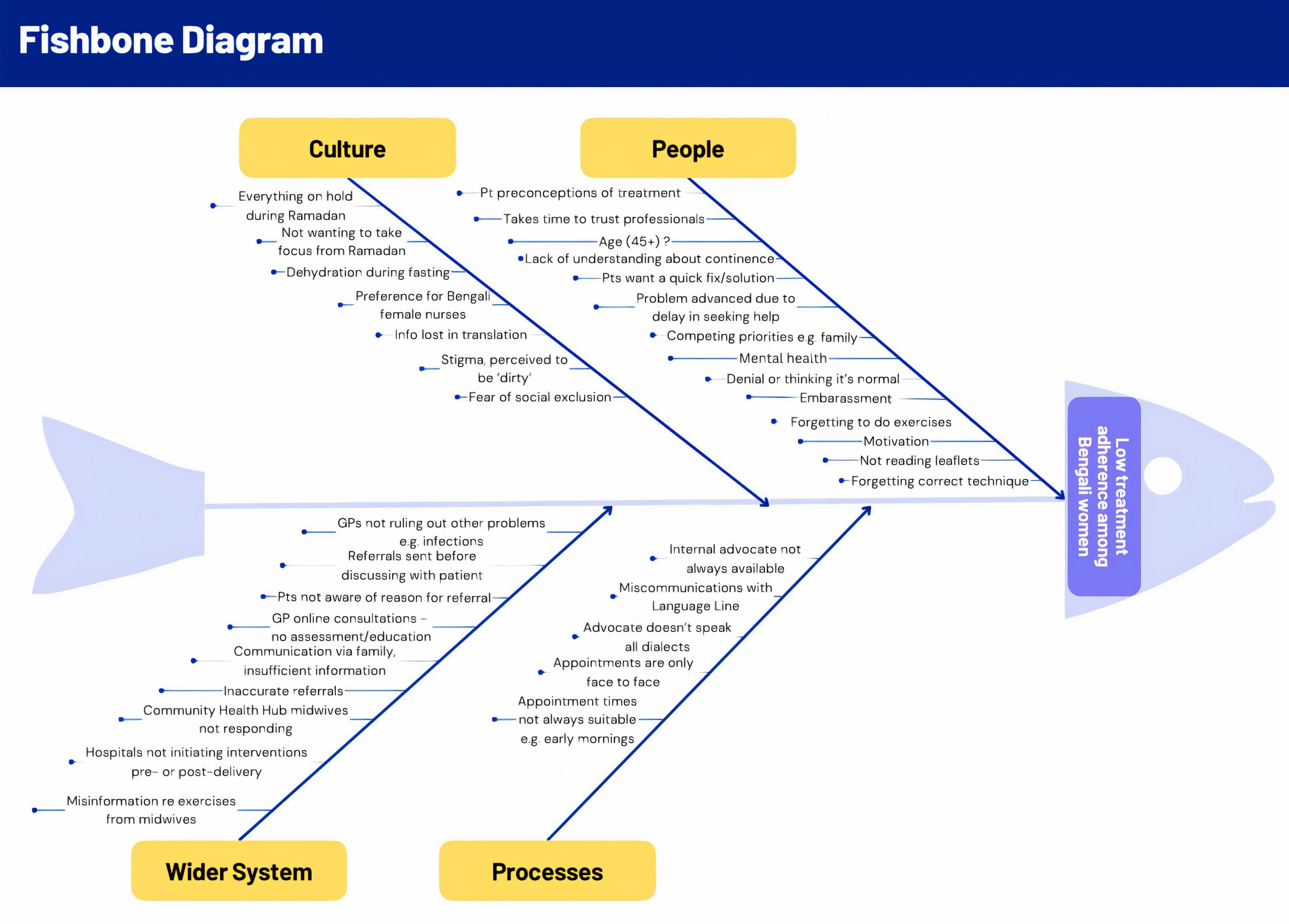
Improving Pelvic Floor Health for Bengali Women in Tower Hamlets
8th November 2024
Authors: Chinny Ejiogu (Continence Lead), Polin Rahman (Bilingual Healthcare Support Worker), Sofia Khan (Service User) and Clarissa Sørlie (Improvement Advisor)
Continence lead Chinny Ejiogu recently launched a quality improvement (QI) project to improve adherence to pelvic floor exercises and promote pelvic floor health among Bengali women in Tower Hamlets.
Over 60% of women in the UK have at least one symptom of poor pelvic health, according to a study by the Royal College of Gynaecology and Obstetricians (2023). These symptoms include urinary incontinence and a frequent urge to wee. Over half of women with pelvic floor dysfunction surveyed had never sought help, with some thinking their symptoms were normal and others being too embarrassed to speak with a healthcare professional. Exercises to strengthen the pelvic floor can prevent development of pelvic floor dysfunction or reduce the severity of existing symptoms, however only 22% of women nationally regularly perform pelvic floor exercises.
Explaining the importance of pelvic health, continence lead Chinny Ejiogu said, “the pelvic floor includes the ligaments, muscles and nerves that support the bladder and other organs. It’s not only responsible for supporting the function of bowel movements, urination, pregnancy and delivery, but it also keeps the bladder, intestines and reproductive organs in place. Being mindful of your pelvic health should be a priority — especially if you are experiencing problems.”
The Tower Hamlets Continence Service, led by Chinny, exists to promote continence and manage incontinence for adults experiencing bladder or bowel dysfunction. Tower Hamlets has the largest Bangladeshi population (34.6%) and Muslim (39.9%) population in England and Wales (Tower Hamlets Council, 2024), and Bengali women make up most of their caseload. The team noticed that only 45% of this group adhered to their treatment plans.
Figure 1. Nkechi Ochulo, Chinny Ejiogu and Funmilayo Oyelayo from the Continence team
Bengali women, like other South Asian women, face additional barriers related to women’s health. These barriers can include language challenges, lack of culturally relevant health information, stigma, faith and religious beliefs, and unconscious bias from healthcare workers (South Asian Health Foundation, 2024). Bilingual healthcare support worker Polin Rahman explained, “due to language barriers, this group of patients didn’t know how to perform pelvic floor exercises properly. They couldn’t recall their clinicians’ advice or feedback regarding pelvic floor muscle contraction or relaxation during initial assessment.” Sofia Khan, a service user on the project team, shared “from my own experience and journey, I’m frustrated that pelvic exercise was never mentioned from the time I had my baby. Mothers put everyone’s needs before their own.”
Given the importance of these exercises for pelvic health and quality of life, Chinny and her team decided to start a QI project to improve adherence to pelvic floor exercises among Bengali women.
Having identified the quality issue, the team turned to understanding the problem in more depth. Together the team of continence specialist nurses and a service user pooled their collective experience about the barriers to adhering to treatment. To do this, they used a fishbone (or cause-and-effect) diagram. This tool helps teams to visually represent their understanding of the causes of a problem (see Figure 2 below).
Figure 2. Fishbone diagram illustrating the team’s understanding of the problem
Now that the team have a shared understanding of the problem, they are in the process of generating change ideas which they will turn into a driver diagram. A driver diagram will help the team to communicate their shared theory of what changes may lead to improvement.
To learn more about the work of the Tower Hamlets Continence Service, listen to their podcast episode on Spotify.
References:
- Royal College of Gynaecology and Obstetrics (2023) ‘RCOG calling for action to reduce number of women living with poor pelvic floor health’. Available at: https://www.rcog.org.uk/news/rcog-calling-for-action-to-reduce-number-of-women-living-with-poor-pelvic-floor-health/#:~:text=New%20data%20reveal%20over%2060,can%20prevent%20and%20improve%20symptoms (Accessed: 17th October 2024)
- South Asian Health Foundation (2024) ‘Health Inequalities: Full Stop’. Available at: https://static1.squarespace.com/static/5944e54ab3db2b94bb077ceb/t/666886212ae9df7d61a3319c/1718126120527/HIFS_Report_SAHF_Final.pdf (Accessed: 17th October 2024)
- Tower Hamlets Council (2024) ‘Tower Hamlets Borough Profile’. Available at: https://www.towerhamlets.gov.uk/Documents/Borough_statistics/Tower-Hamlets-Borough-Profile-2024.pdf (Accessed: 17th October 2024)
Most Read Stories
-
Why is Quality Control important?
18th July 2018

-
An Illustrated Guide to Quality Improvement
20th May 2019

-
2016 QI Conference Poster Presentations
22nd March 2016
-
Recognising Racism: Using QI to Help Take Action
21st January 2021

-
Using data enabled us to understand our problem
31st March 2023

-
QI Essentials: What does a Chief Quality Officer do?
18th March 2019


Follow QI on social media
To keep up to date on the latest concerning QI at ELFT, follow us on our socials.




